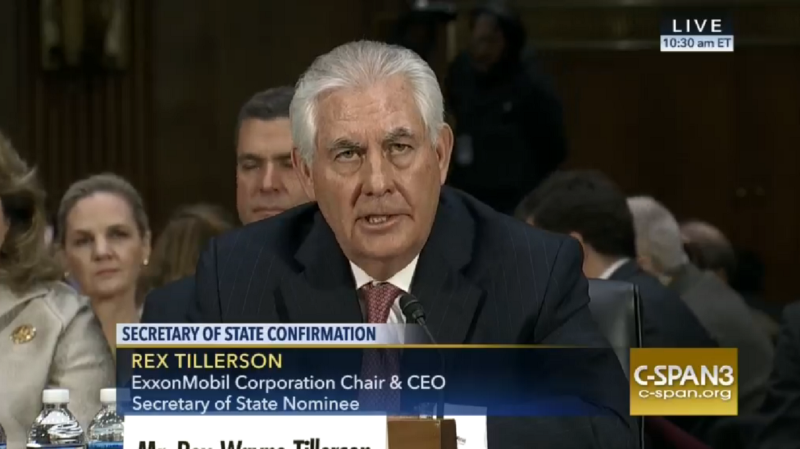Exxon's CEO Got Congress to Kill an Anti-Corruption Bill the Day He Became Secretary of State
February 21, 2017

On February 1, 2017, as the Senate was confirming ExxonMobil CEO Rex Tillerson to be Secretary of State, on the other side of the Capitol Building the House of Representatives was voting to repeal an obscure anti-corruption rule that Tillerson and ExxonMobil had lobbied against for years.
The rule (Section 1504) requires all oil, gas, and mining companies listed on U.S. stock exchanges to disclose payments they make to foreign governments while negotiating deals in their countries.
By repealing it Congress is letting ExxonMobil and other companies once again make secret payments to foreign governments. The Senate followed suit just days after the House vote, and the repeal of the anti-corruption rule was signed into law by President Trump on Valentine’s Day.
The repeal of this anti-corruption rule will help fill the swamp across the globe.
Fighting global corruption with transparency
Why did Congress pass this anti-corruption rule to begin with?
Back in 2010 a bipartisan group of lawmakers wanted to help solve a problem that affects many developing nations. In countries like Venezuela, Libya, and Nigeria that have the natural resources to boost their economies and pull people out of poverty, the governments were instead becoming corrupt and hoarding the wealth.
It’s a phenomenon known as the “resource curse,” and many academic studies have documented it. Countries with economies based around oil and mineral wealth tend to score lower on the U.N. Human Development Index. They also have more corruption and a larger portion of their populations living in poverty.
The lawmakers behind Section 1504 wanted to give people in poor countries the information they needed to hold their governments accountable. It was a creative way to make a difference in the developing world, and according to its authors, Republican Senator Richard Lugar and Democratic Senator Ben Cardin, it would also be good for Americans.
“[The resource curse] has empowered anti-American dictators in Iraq, Libya and Syria,” Lugar and Cardin write in The Hill. “It worsens global poverty, which can be a seedbed for terrorism, as in Yemen. It dulls the effect of our foreign assistance, and it can lead to instability that crimps global oil supplies and raises pump prices for American motorists.”
Tillerson and ExxonMobil fight for secrecy
ExxonMobil wasn't the only oil companies opposed Section 1504, but they were by far the most vocal opponent. When Section 1504 was moving through Congress in 2010, Rex Tillerson flew to Washington to lobby against it and try to convince its sponsors to pull the plug. According to Michael Grunwald, reporting for Politico, Tillerson argued that disclosing their payments to foreign governments would put ExxonMobil at a competitive disadvantage. He also said it would make it especially hard for the company to do business in Russia, where the oil industry is closely tied to the government.
As Politifact notes, Tillerson was the only oil executive who actually showed up in person to lobby against the rule while it was advancing in Congress. And even after it passed ExxonMobil worked to stop its implementation by lobbying the Securities and Exchange Commission (SEC) and filing their objections in letters dated Jan. 31, 2011, March 15, 2011 and Oct. 25, 2011. Their most recent comment to the SEC on the matter is dated March 8, 2016.
While Tillerson and ExxonMobil were fighting the rule, their competitors at Shell and BP were telling the SEC that while they weren't thrilled about the rule, they would support it (with some minor changes).
ExxonMobil has had their foreign deals investigated on more than one occasion. In 2003 they were part of an investigation by the US Department of Justice into payments worth $500 million that were made to the President of Equatorial Guinea. And in 2009 Nigeria’s economic and financial crimes commission looked into a suspicious lease agreement ExxonMobil received from the government for developing the country’s “Crown of Jewels” oil field.
Greasing the skids
It's suspicious that an obscure anti-corruption rule that Tillerson had personally lobbied against was attacked by Congress on the same day Tillerson was confirmed as Secretary of State.
We don't have evidence that Tillerson made a deal to protect his business interests. But we do know that ExxonMobil and Tillerson invested millions of dollars in campaign contributions and lobbying to try to get Congress to repeal Section 1504.
Since 2010, ExxonMobil has spent more than $88 million lobbying Congress and the federal government. Rex Tillerson has contributed personally to many of the politicians in charge of deciding which bills get voted on. He gave $2,700 to House Speaker Paul Ryan in the most recent election and $1,900 to Senate Majority Leader Mitch McConnell in 2014, the last time he was up for re-election. Tillerson also gave more than $80,000 to Republican political committees during the 2016 election cycle.
But nothing makes all this lobbying and campaign spending work like a trip through the revolving door. Research shows that when corporate lobbyists take jobs in the government, the companies they used to work for tend to see bigger returns on their lobbying investments.
It looks like ExxonMobil just scored a major victory for their government relations. Tillerson will have the constant ear of President Trump, who will be deciding on major issues affecting the company - including the Russian sanctions - and can lean on Congress to do things like repeal Section 1504.
Tillerson may, after all, be able to return to ExxonMobil once he’s done working in the administration. In the divestment documents he filed with the SEC, there appears to be a loophole that would let him rejoin the company.